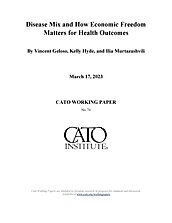We investigate the institutional foundations of public health. We argue that a key distinction in analysis of disease is between diseases of commerce (diseases associated with movement of people and with affluence) and diseases of poverty (primarily noncommunicable diseases that depend on wealth and income). We show that the mix of disease – the ratio of communicable diseases and those associated with longevity to diseases of poverty – increases in economically free countries. We argue that increasing burdens of diseases of commerce reflects the quality of institutions, as those diseases are better than living shorter, brutish lives where diseases of poverty claim many lives. This analysis also highlights an institutional trade-off: economically free institutions reduce certain types of disease while contributing to others.
Disease Mix and How Economic Freedom Matters for Health Outcomes
What is the relationship between economic freedom (i.e., secure property rights, limited regulation, sound money, free trade, etc.) and public health?

